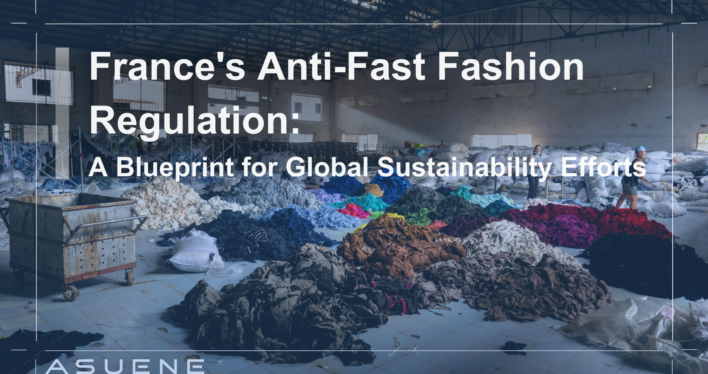- Article Summary
-
Overview
France is proactively addressing the negative environmental and social impacts of fast fashion through stringent new regulations. Globally, fast fashion contributes significantly to pollution, waste, overconsumption, and unsustainable production practices. France’s recently adopted Anti-Fast Fashion Law specifically targets ultra-fast fashion brands, providing a clear regulatory distinction from broader waste management initiatives. This targeted approach sets an influential example for driving sustainability efforts across the global fashion industry.
Key Features of France’s Anti-Fast Fashion Law
Strict Sanctions and Eco-Scoring
The law introduces a mandatory environmental scoring system (“eco-score”) for fast fashion brands, designed to comprehensively evaluate the environmental footprint of products, including factors like emissions, resource usage, and recyclability. Companies receiving lower eco-scores will face escalating taxes intended to incentivize improvements in production practices and transparency:
- An initial tax of up to €5 per product will be introduced by 2025.
- This tax will subsequently increase to a maximum of €10 per product by 2030.
- Crucially, to prevent disproportionate burdens on businesses and consumers, taxes will be capped at 50% of the item’s sale price.
Advertisement and Influencer Promotion Ban
In an effort to curb overconsumption driven by aggressive marketing, the law explicitly bans all advertisements promoting fast fashion products. Additionally, influencers and online content creators will face strict restrictions and penalties if they promote products from ultra-fast fashion brands. This measure specifically aims to reduce consumer demand and encourage more mindful purchasing behaviors.
Penalties for Overproduction and Unsustainability
Ultra-fast fashion companies identified as engaging in overproduction or unsustainable practices will be subject to substantial financial penalties and increased regulatory scrutiny. The law requires these companies to provide detailed, transparent reports on their environmental impacts, including production volumes, waste management practices, and compliance with sustainability standards. These transparency measures ensure accountability and encourage industry-wide improvements in environmental stewardship. and reporting on their environmental impacts.

Why France’s Anti-Fast Fashion Law Could Be a Global Model
France has historically influenced global sustainability standards and now aligns its regulations closely with international frameworks such as the UN Sustainable Development Goals and the EU Green Deal. The following comparative table highlights France’s unique position compared to existing regulations in other major markets:
| Regulatory Aspect | France (Anti-Fast Fashion Law) | European Union | United States | United Kingdom |
|---|---|---|---|---|
| Eco-Score & Taxes | Yes (up to €10/product by 2030) | Partial | No | Partial |
| Advertisement Ban | Yes (complete ban) | Partial restrictions | No | Partial restrictions |
| Penalties for Unsustainability | Strong & explicit | Moderate | Minimal | Moderate |
| Transparency Requirements | Mandatory & comprehensive | Comprehensive | Limited | Moderate |
Challenges and Industry Perspectives
Implementing stringent regulations comes with notable challenges:
- Economic Impact: Industry representatives, such as those from Shein, highlight concerns over reduced purchasing power among consumers.
- Regulatory Burdens: International brands face increased complexities in supply chain transparency and reporting.
Industry experts and brands emphasize the necessity of collective regulatory action rather than isolated targeting, advocating for balanced solutions that ensure both environmental sustainability and economic viability.
Environmental groups, however, express concerns over the legislation’s scope. Pierre Condamine of Friends of the Earth France described the bill as a “missed opportunity” due to its focus on Chinese ultra-fast fashion giants like Shein and Temu, leaving major European brands such as Zara, H&M, and Kiabi largely unaffected.
Lawmakers such as Senator Sylvie Valente Le Hir defend this approach, emphasizing the importance of protecting European industries against vastly larger competitors.
Implications for Consumers and the Global Fashion Market
These regulations are expected to significantly shift consumer behaviors, driving increased demand for sustainably-produced apparel. Consumers are likely to become more discerning and value transparency in production processes, ethical sourcing, and environmental stewardship. Consequently, global ultra-fast fashion brands will be compelled to fundamentally alter their business models towards sustainable production, greater transparency, and responsible marketing practices. This shift is not only regulatory-driven but also consumer-driven, as awareness of sustainability issues continues to rise globally. Companies proactively embracing sustainability—through innovative practices, transparent communication, and genuine commitment to environmental standards—stand to gain considerable competitive advantages, including brand loyalty, increased market share, and long-term profitability.
Conclusion
France’s targeted Anti-Fast Fashion Law represents a pivotal step in combating the environmental crisis driven by ultra-fast fashion. Its innovative approach and robust measures offer a scalable regulatory blueprint that could be adopted internationally. Ultimately, the success of such measures will depend on a combined effort encompassing regulation, industry innovation, and shifts in consumer awareness and behavior.
Why Work with ASUENE Inc.?
Asuene is a key player in carbon accounting, offering a comprehensive platform that measures, reduces, and reports emissions, including Scope 1-3. Asuene serves over 10,000 clients worldwide, providing an all-in-one solution that integrates GHG accounting, ESG supply chain management, a Carbon Credit exchange platform, and third-party verification.
ASUENE supports companies in achieving net-zero goals through advanced technology, consulting services, and an extensive network.


